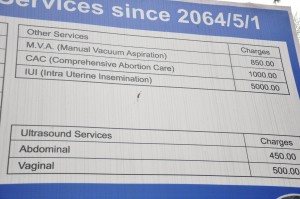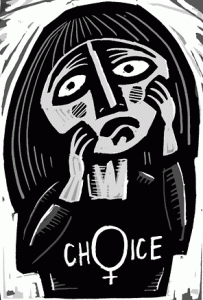Safe and Legal, but Expensive:
On Sept. 28, as we observed the Global Day of Action for Safe and Legal Abortion, I could not help but wonder if we shouldn’t also add the word affordable to it. After all, we are fighting to make abortion a viable option for all pregnant women. But today, the cost of abortion care is pretty high worldwide, and several women simply cannot afford to choose abortion when pregnant.

This is true even in countries where abortion is legal. For example, take Nepal. I recently discovered that comprehensive abortion care, which is widely promoted, costs 1000 Nepali Rupees. This is a massive barrier for poor and dependent women, according to ASAP Steering Committee Member and Ipas Nepal’s Director Dr. Indira Basnett.
In countries where abortion laws are stringent, there is often no tenet to regulate the cost of terminating a pregnancy. This allows clandestine black markets to flourish and fleece women in a time of need, says Inna Hudaya, the founder of Samsara in Indonesia. The law in the country, she writes, does not protect women but allows businesses to take advantage of their desperation. Such black markets have also mushroomed elsewhere in Asia, and the world.
Then there are countries like India, where abortion is supposed to be free in the public sector. But in reality, some state-run hospitals charge anything between 100 INR and 3000 INR for an abortion, and little is done to stop this.
With the American elections looming close, the world is also scrutinizing the country’s abortion laws. Currently, insurance companies are banned from covering abortions in some states, while in others women are forced to buy an additional premium to sign up for coverage. Some women cannot afford this premium, and others forego it, because they dont see themselves as ever needing an abortion.
The U.S. also controls a large amount of money that funds family planning services around the world. While an Obama-Biden victory will keep these programs alive, a Romney-Ryan leadership threatens to issue the “gag” rule that repeals this policy, and prevents American aid from reaching any of these programs. This will affect the cost of abortion and other maternal health care services in several developing countries.
Conservative voices find it easy to rationalize the high cost of abortion care. Free abortions, they threaten, will encourage women to become “morally loose.” This argument reeks of patriarchy and misogyny, but enjoys wide support. Even some providers echo such concerns. During our workshop for mid-level providers, Yasmeen Saggu, a participant from Pakistan said, “Contraceptives should be given free of cost. But abortion should not be free. Otherwise women will act immorally.”
 It is also hard to ignore the capitalistic motives behind this unfair burden on women. Abortion is framed as reproductive choice, and as Marlene Gerber Fried wrote in 10 Reasons to Rethink Reproductive Choice, ”In our capitalistic society, choices are consumer decisions.” We are made to “choose” by buying a commodity in such an economic framework, and it explains why the hefty price tag that comes with abortion does not receive as much flak as it should in this global capitalist economy.
It is also hard to ignore the capitalistic motives behind this unfair burden on women. Abortion is framed as reproductive choice, and as Marlene Gerber Fried wrote in 10 Reasons to Rethink Reproductive Choice, ”In our capitalistic society, choices are consumer decisions.” We are made to “choose” by buying a commodity in such an economic framework, and it explains why the hefty price tag that comes with abortion does not receive as much flak as it should in this global capitalist economy.
Ideally, all states should be held responsible for providing safe, legal and cheap (or free) abortions in the public sector, without dissecting a woman’s morality or probing the size of her bank balance. Governments that don’t already do this, do not offer abortion as a ”choice” to all women, but only to those who can afford it. Other women are condemned to two outcomes: a forced pregnancy, or an unsafe abortion.






